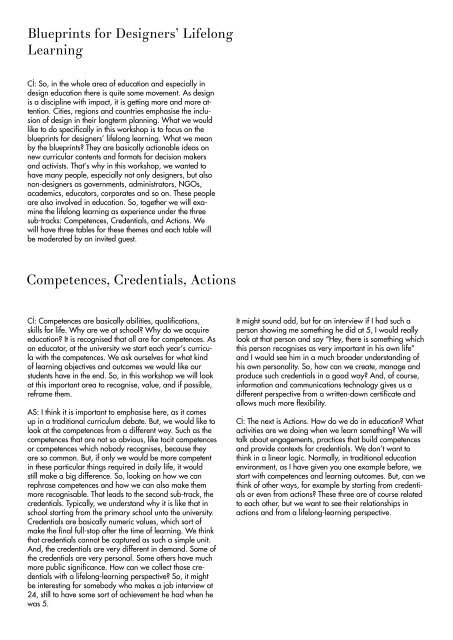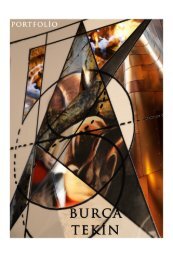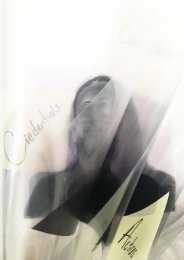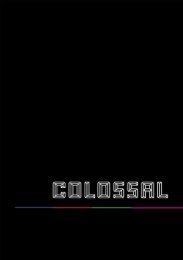hadii
You also want an ePaper? Increase the reach of your titles
YUMPU automatically turns print PDFs into web optimized ePapers that Google loves.
Blueprints for Designers’ Lifelong<br />
Learning<br />
Session 1 - Me as Learner - Personal<br />
Accounts of Lifelong Learners<br />
Cİ: So, in the whole area of education and especially in<br />
design education there is quite some movement. As design<br />
is a discipline with impact, it is getting more and more attention.<br />
Cities, regions and countries emphasise the inclusion<br />
of design in their longterm planning. What we would<br />
like to do specifically in this workshop is to focus on the<br />
blueprints for designers’ lifelong learning. What we mean<br />
by the blueprints? They are basically actionable ideas on<br />
new curricular contents and formats for decision makers<br />
and activists. That’s why in this workshop, we wanted to<br />
have many people, especially not only designers, but also<br />
non-designers as governments, administrators, NGOs,<br />
academics, educators, corporates and so on. These people<br />
are also involved in education. So, together we will examine<br />
the lifelong learning as experience under the three<br />
sub-tracks: Competences, Credentials, and Actions. We<br />
will have three tables for these themes and each table will<br />
be moderated by an invited guest.<br />
Competences, Credentials, Actions<br />
Cİ: Competences are basically abilities, qualifications,<br />
skills for life. Why are we at school? Why do we acquire<br />
education? It is recognised that all are for competences. As<br />
an educator, at the university we start each year’s curricula<br />
with the competences. We ask ourselves for what kind<br />
of learning objectives and outcomes we would like our<br />
students have in the end. So, in this workshop we will look<br />
at this important area to recognise, value, and if possible,<br />
reframe them.<br />
AS: I think it is important to emphasise here, as it comes<br />
up in a traditional curriculum debate. But, we would like to<br />
look at the competences from a different way. Such as the<br />
competences that are not so obvious, like tacit competences<br />
or competences which nobody recognises, because they<br />
are so common. But, if only we would be more competent<br />
in these particular things required in daily life, it would<br />
still make a big difference. So, looking on how we can<br />
rephrase competences and how we can also make them<br />
more recognisable. That leads to the second sub-track, the<br />
credentials. Typically, we understand why it is like that in<br />
school starting from the primary school unto the university.<br />
Credentials are basically numeric values, which sort of<br />
make the final full-stop after the time of learning. We think<br />
that credentials cannot be captured as such a simple unit.<br />
And, the credentials are very different in demand. Some of<br />
the credentials are very personal. Some others have much<br />
more public significance. How can we collect those credentials<br />
with a lifelong-learning perspective? So, it might<br />
be interesting for somebody who makes a job interview at<br />
24, still to have some sort of achievement he had when he<br />
was 5.<br />
It might sound odd, but for an interview if I had such a<br />
person showing me something he did at 5, I would really<br />
look at that person and say “Hey, there is something which<br />
this person recognises as very important in his own life”<br />
and I would see him in a much broader understanding of<br />
his own personality. So, how can we create, manage and<br />
produce such credentials in a good way? And, of course,<br />
information and communications technology gives us a<br />
different perspective from a written-down certificate and<br />
allows much more flexibility.<br />
Cİ: The next is Actions. How do we do in education? What<br />
activities are we doing when we learn something? We will<br />
talk about engagements, practices that build competences<br />
and provide contexts for credentials. We don’t want to<br />
think in a linear logic. Normally, in traditional education<br />
environment, as I have given you one example before, we<br />
start with competences and learning outcomes. But, can we<br />
think of other ways, for example by starting from credentials<br />
or even from actions? These three are of course related<br />
to each other, but we want to see their relationships in<br />
actions and from a lifelong-learning perspective.<br />
Cİ: In the first session, we will make the first distribution of<br />
the participants into the three groups. During this workshop,<br />
you will notice that we will change our contexts and move<br />
from more personal or individual learning experiences like ‘I<br />
as learner’ to more plural ones such as ‘we as learners’ and<br />
’they as learners’. All of these will be projections and become<br />
the basis for the proposal that we would like to submit to the<br />
World Design Summit Montreal in 2017. In the first session,<br />
we would like you to set the ground by dealing with your own<br />
personal accounts or stories as ‘learning contexts’ from the<br />
perspective of each of three groups Competences, Credentials<br />
and Actions. Please consider yourself in a time-span either<br />
from your childhood, or from the present moment, or you can<br />
make a future projection. And, please consider yourself as a<br />
learner who had a specific learning. At the tables, your group<br />
moderators will guide you in more details.<br />
Session 3 - Them as<br />
Learners - Future<br />
Projections and Preliminary<br />
Conclusion by Introducing three<br />
Persona as Lifelong Learners<br />
Cİ: In the third session, we would like you to summarise the<br />
whole workshop and confirm the work you have already<br />
produced in the previous two sessions by introducing three<br />
possible personas or users, whom we call lifelong learners.<br />
We are of course still talking about designers as lifelong learners.<br />
So, we will try to conclude the workshop, which started<br />
with ‘I’ as a personal account of learner, then opened up on<br />
‘We’ as one particular lifelong learning experience/scheme<br />
in the second session, and finally in the third session, that will<br />
lead to ‘Them’ as a future vision or projection.<br />
AS: By doing so in the third step, we should be aiming at<br />
more radical than what we have been so far. Also, we should<br />
identify our group themes of Competences, Credentials and<br />
Actions more narrowly and clearly. Because, I think, we saw<br />
in the previous presentations that the competences could also<br />
be part of the actions, or the credentials could be part of the<br />
actions, and so forth. So, we would like you to do this third<br />
session to get that focus, but at the same time to be more<br />
plausible as a projection. Because, in the end, we want to<br />
compile a document, which could offer perspectives of what<br />
lifelong learning for designers can be, and at the same time<br />
something which can present and communicate to others. So,<br />
we expect that this workshop is not just an exercise, but in the<br />
best case it would lead to real proposals and real programs,<br />
either here or in other places.<br />
Session 2 - We as Learners -<br />
Landscape Detailing One<br />
Lifelong Learning Experience<br />
Cİ: In the second session, we will shuffle the teams and<br />
ask the participants, according to the group dynamics,<br />
to move to the other theme-tables. So, we will ask you to<br />
work in new groups on a joint picture, a kind of mural.<br />
This time, it is not a personal portrait, but a landscape<br />
view that you should be detailing one particular lifelong<br />
learning experience.<br />
AS: You are free to use any visual models, diagrams, or<br />
scenarios, where you sketch out what it means for one person<br />
to go through a learning experience with this group<br />
specific focus.<br />
We want to carry that beyond this workshop. Therefore,<br />
this third session is very important to capture the essence<br />
of the previous two sessions in a visual and tangible<br />
way as a scaffold. We expect three separate posters.<br />
Most possibly, they are very different to each other to<br />
communicate the scope of your ideas. The scope could<br />
be different in terms of the age-brackets or pre-requisites<br />
you look at, or the breath of knowledge or competence,<br />
or the credentials you are looking at. Please<br />
try to make sure that these three personas are different.<br />
The more persona-type it is, maybe the easier to discuss<br />
about and communicate our ideas. For example, in<br />
the case of credentials, the possible persona would be<br />
somebody who somehow produce, manage or receive<br />
credentials for some purpose, expectations or rewards<br />
as a projection beyond what we see, have and practice<br />
today.






